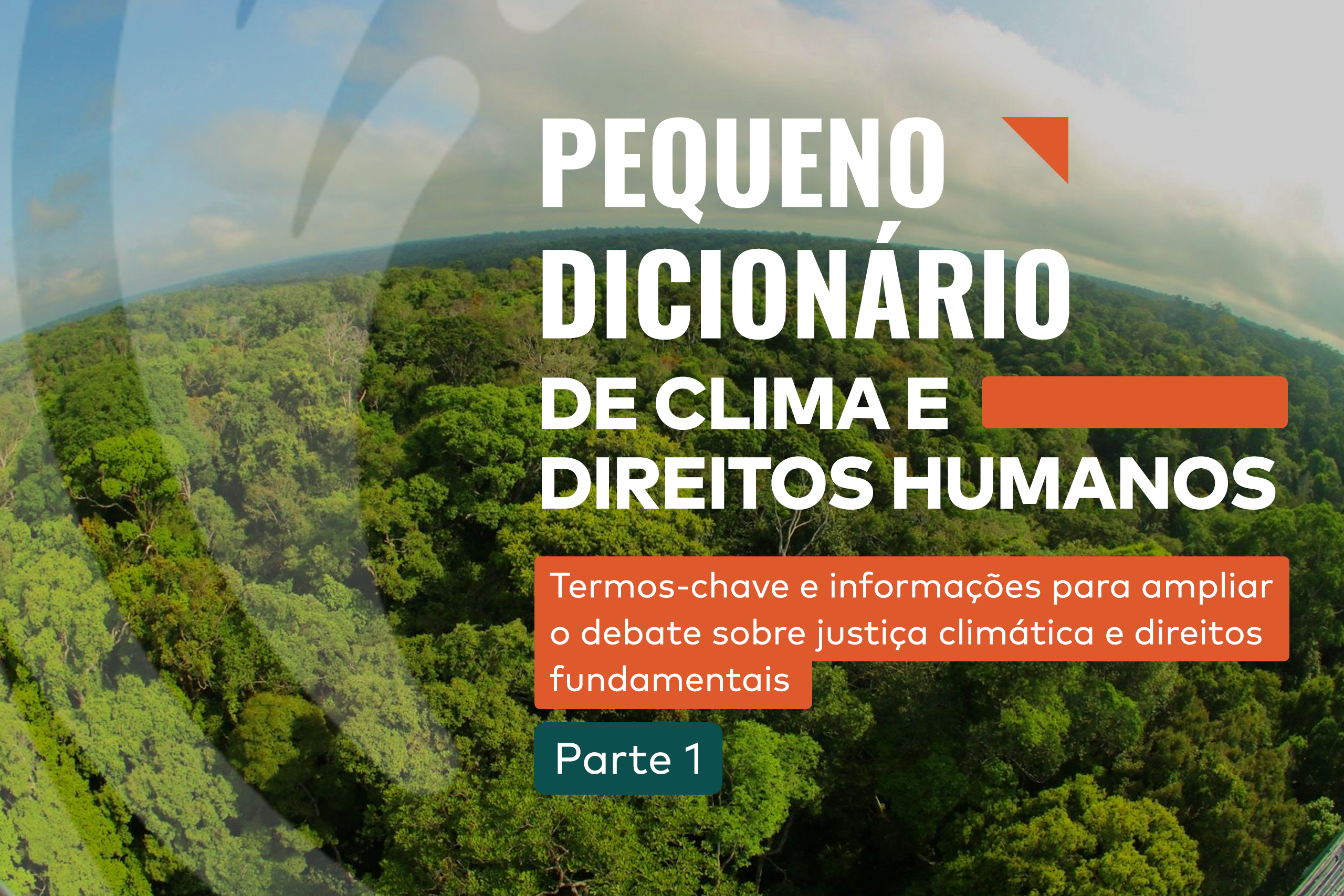Climate and Human Rights Glossary – Part 1
Conectas has compiled a list of key terms with a view to widening the debate on climate justice and fundamental rights; see the entries below

As mobilization around the climate agenda is growing, the National Congress is moving forward with proposals that could undermine the rights of Indigenous peoples and quilombola communities, according to experts and social organizations. One of these is what has been dubbed the “Devastation Bill” which was recently approved by the Legislature and has been partially vetoed by President Luiz Inácio Lula da Silva. The bill eases environmental and territorial safeguarding regulations.
Brazil finds itself on the horns of a dilemma caught between a combination of international expectations and domestic setbacks: how to reconcile the commitments it has signed up for in the global arena with effective protection of rights and territories at home.
To stimulate the debate, Conectas is launching the series, Climate and Human Rights Glossary, with information about the key concepts in the field. The aim is to contribute to understanding of the terms most frequently used in public debates and international negotiations.
Read more
Part 1 presents ten entries for anyone looking to engage more deeply in the debate. See below:
The Paris Agreement: the main international climate treaty. The Agreement came into effect on 4 November 2016 and currently has 195 Parties, 194 of which are outside the European Union. The Agreement was adopted to fight climate change by setting global goals to reduce greenhouse gas emissions (NDCs). Its main objective is to implement measures that reduce these gases, with the aim of keeping the global temperature increase well below 2 °C in relation to pre-industrial levels, while pursuing efforts to limit the increase to 1.5°C. Brazil is one of the signatories, and the Agreement reinforces the importance of human rights in global climate action.
Climate Adaptation: refers to measures and adjustments in natural and human systems to address the real and expected impacts of climate change, aiming to reduce vulnerabilities and increase resilience in the face of extreme events and environmental transformations. From an anti-racist perspective, climate adaptation acknowledges that Black, Indigenous, and low-income populations have historically been the most affected and therefore must be prioritized and heard in this process, ensuring that their needs, knowledge and rights are at the center of planning and implementation of policies, promoting social and environmental justice.
Agroecology: an approach to agricultural production that integrates ecological and social principles, promoting sustainable, fair, and biodiverse food systems. It prioritizes the independence of communities, the use of traditional knowledge and respect for the environment, unlike monoculture, which reduces agricultural diversity. The FAO reports that 75% of crop diversity was lost in the last century, mainly due to monocultures. In Brazil, from 1989 to 2020, the area of soybean plantations grew by 221% (Conab). Under the government of Jair Bolsonaro, the number of approvals granted for pesticides reached record levels, favoring agribusiness. By contrast, in Latin America, family farmers maintain over 2,350 kinds of food, and the MST is a leader in organic rice production. Agroecology values the independence of communities, and defends the universal right to food.
Biomes: large ecosystems characterized by a particular combination of vegetation, fauna and similar climatic conditions. There are six main biomes in Brazil: The Amazon, Cerrado, Caatinga, Atlantic Rainforest, Pantanal and Pampa. Each of these biomes has distinct characteristics in terms of vegetation, climate and fauna, and are essential for biodiversity and global ecological balance.
Traditional Communities: groups of people whose ways of life are culturally rooted in their territories, such as quilombola communities, riverine peoples (ribeirinhos), Caiçara communities (coastal peoples), extractivists, Romani people, artisanal fishers, and Pantanal communities, among others. Brazil recognizes 29 categories of these peoples, who hold ancestral knowledge that is fundamental to environmental conservation, and are often the most affected by the climate crisis.
United Nations Framework Convention on Climate Change (UNFCCC): an international agreement signed in Rio de Janeiro in 1992. It established the framework for global climate action, recognizes the threat of climate change, and sets out the goal of stabilizing greenhouse gas concentrations in the atmosphere.
COP (Conference of the Parties): the principal body of the United Nations Framework Convention on Climate Change (UNFCCC). The signatory countries meet annually to review progress made, negotiate agreements and make decisions on global climate action, including mitigation and adaptation goals. The first COP took place in 1995 in Berlin and it has been held annually in different countries since then. Twenty-nine sessions were held up to 2024. The next conference, COP30 will take place in November 2025 in the city of Belém, Brazil.
Zero Deforestation: a target aimed at eliminating the loss of forestland, through sustainable management and conservation measures. It is essential for protecting biodiversity, mitigating climate change, and safeguarding the rights of peoples and communities that depend on these ecosystems.
Climate Disinformation: the intentional or negligent spread of false or misleading information about climate change, designed to confuse the general public, undermine scientific consensus, and delay action. The 2025 Global Risks Report identifies disinformation and the climate crisis among the greatest risks of the decade. A study by Global Witness shows that misleading content on Facebook receives up to eight times more engagement than evidence-based posts. On YouTube, 70% of climate denial content targeted solutions and generated US$13.4 million for the platform in 2023. In Brazil, NetLab identified 351 fraudulent claims about flooding in Rio Grande do Sul. The Articulation Room Against Disinformation proposed holding platforms accountable and in 2024, the government, the UN, and UNESCO launched a global initiative to tackle campaigns of this nature.
Human Rights and Climate: refers to the intrinsic connection between protecting human rights and climate action. The impacts of climate change, such as extreme events and environmental degradation, directly affect fundamental rights, including health, housing, food, and life, requiring an integrated approach.






